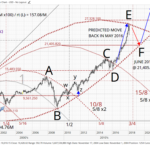While it seems that trade disputes between the US, Mexico, and Canada are de-escalating, the trade conflict with China is not. President Trump ramped up the trade war on Monday as $200 billion in Chinese imports took effect. This is the third round of US tariffs on Chinese imports, a significant escalation of the conflict between the world’s two largest economies.

And caught in the middle of the crossfire are US retailers, who have spent a great deal of time on investor conference calls warning about imminent price hikes during the upcoming holiday season, which could send shock waves through the wallets of American consumers.
The chief executives from Walmart, Target, Gap Inc. and Best Buy, among others, have been some of the most vocal companies warning about “unavoidable” price hikes.
According to a letter from Robert Lighthizer, the US Trade Representative, tariffs on some $200 billion worth of Chinese imports took effect Monday. There are several hundred items on the list, including electronics, kitchenware, tools, and food. The taxes are set around 10 percent but will jump to 25 percent at the beginning of 2019.
The resulting margin compression will force retailers to either eat the cost of the tariffs or pass it along to consumers, right before the critical holiday season: “The new tariffs are bad news for the retail sector, especially as the latest round seems to extend the tax to a vast array of consumer goods,” GlobalData Retail Managing Director Neil Saunders said in comments emailed to unavoidable.
“Many retailers will now be faced with a difficult choice of whether to pass the cost increases across to consumers or to take a hit on their margins. The exact response will vary from retailer to retailer but, both strategies are likely to be used.”
In a late cycle economic environment, tariffs are especially dangerous for retailers because it could exacerbate the effects of other rising costs, “including more spending on technology, elevated logistics costs, higher gas prices, and rising labor expenses. In short, additional tariffs are the last thing the retail sector wants,” according to Saunders.














Leave A Comment